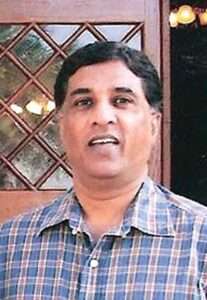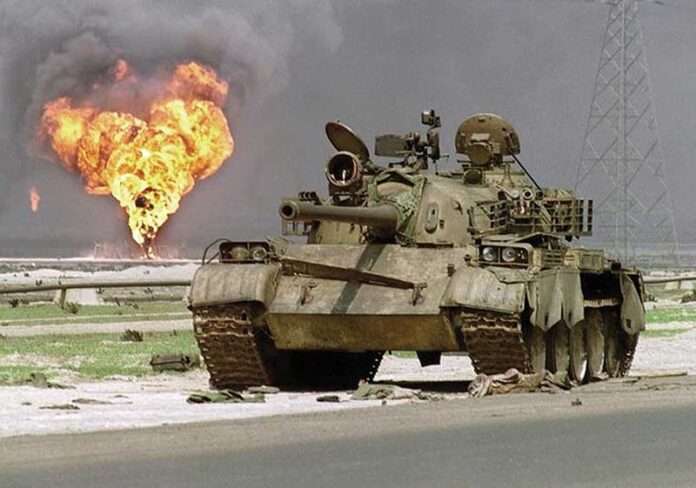Following the invasion of Kuwait on 2 August 1990 and the ensuing months of occupation of the country, many distressed Indian expatriates looked to the Indian Citizens Committee (ICC), a grouping of volunteers and Indian community leaders, for assistance, security and protection.
In the absence of any semblance of law and order, and limited presence of Indian embassy officials, the ICC was formed with the aim of assisting the vast Indian community to cope with the crisis by providing food, shelter, and means of communication, as well as organizing the daunting task of helping evacuate over a hundred thousand Indians back to India. It was a mammoth responsibility that the members of ICC took on, often at risk to their own lives.
The ICC originally comprised 51 members, of whom five were selected to form the executive committee, with the late H.S. Vedi being designated as convenor and coordination-secretary of the committee. Although many of the organization’s members left Kuwait within months of the invasion, eight members, Narinder Singh Sethi, N.V.K. Warrier, Roy Abraham, Thomas Chandy, K.K. Nair, Ali Hussain, M. Matthews and H.S. Vedi stayed on until substantial numbers of the Indian community were evacuated over the next several months.

The logistics of such an operation was staggering, and India’s national airline, Air India, in particular, did a sterling job, especially considering that they did not have an office or agent in Jordan, the closest ‘safe’ country to stage such a massive evacuation process. Air India set a global record in humanitarian flights by evacuating more than 150,000 people free of charge from Amman in Jordan to Mumbai, India, and completing this operation in a record time of little over two months from August to October 1990.
In the meantime, the Salmiya Indian School served as a base, providing food, shelter, and medical assistance to needy community members, as well as to citizens of other countries. Matthews, Abraham, and Nair left on 18 October. Exactly one month later, Chandy, Hussain, and Warrier departed Kuwait. Only two members, Sethi and Vedi, remained of the original 51 ICC members. To help them, five new members , Indira Sharma, N.V. Madhavan, Mathew Kuruvilla, Damodaran Sharma, and Prakash Shaw were inducted into the ICC, keeping the organization going during the particularly arduous months just prior to and post Kuwait’s liberation.
Indira Sharma, the then headmistress of Indian School, transformed the basement of the Salmiya Indian School into a hideout, and prepared food for the many homeless and destitute who relied on the school for shelter. Madhavan, the then head of the microbiology department at Jahra Hospital, treated Indians suffering from various ailments to the best of his ability. He even monitored patients admitted into Iraqi controlled hospitals in Kuwait, fearing they would not receive adequate treatment from the occupation forces.
A ham radio operator named Shaji, assisted by Kuruvilla, ignored the grave dangers involved in such a venture and used the Indian ambassador’s car to smuggle his radio equipment into the school. The radio was vital as now committee members could contact Delhi to keep them abreast of events in Kuwait and to receive instructions. The equipment also helped Indians, who either chose to stay in the country or were simply unable to leave, with a means to communicate with their worried families back in India.
On several occasions, ICC members, at the risk of being thrown in prison, beaten up, or even shot, intervened when Iraqi soldiers looted apartments still inhabited by Indians. The bravery of these committee members was indeed remarkable, considering that they were ordinary civilians, and the situation of being confronted by soldiers wielding Kalashnikov rifles was as foreign and terrifying to them as it was to the people whom they were helping.
ICC members also successfully resisted attempts by Iraqi officers and soldiers to confiscate buses and cars at gunpoint from the Indian School premises that were being used to ferry Indians from Kuwait as part of the evacuation process. Myriad other more prosaic, yet equally important tasks had to be performed by the ICC members, including helping with the collection, storage and distribution of food sent by the Indian government under the aegis of the International Red Cross (IRC), which was then provided to members of the Indian, Sri Lankan, Vietnamese, Filipino, Russian and Bulgarian communities still remaining in Kuwait.
The ICC also kept tabs on Indians arrested by Iraqi authorities, and whisked off to prisons in Basra and elsewhere in Iraq, by coordinating with the Indian Ambassador in Baghdad, H.E. Kamal Bakshi. ICC members offered the prisoners legal support and whatever personal assistance they could. An example is the actions of Ali Shabeer who risked arrest to plead with Iraqi courts for the release of two Indian nationals, illegally arrested and imprisoned in Iraqi jail.
Despite the ICC’s stellar work during the crisis their responsibilities did not end with the liberation of Kuwait in February 1991 by the UN Coalition forces. In conjunction with the Kuwait Red Crescent and the US Task Force for Civil Affairs, the ICC ensured Indians did not go without food. George Z. Padar, a US Army colonel, in a congratulatory letter to the committee commended the ICC for their “caring, selfless attitude,” and “the efficient distribution of donated food to numerous needy members of the community.”
Another major ICC humanitarian effort was the allocation of buses and drivers to the International Organization for Migration (lOM) to transport almost 3,000 refugees from the Abdaly border to the Kuwait International Airport. The committee also provided transport for volunteer medical personnel to the Handicapped Children’s Hospital.
In a letter to the Indian Ambassador to Kuwait, the IOM expressed their gratitude to the ICC “for their altruistic efforts without which this humanitarian resettlement of refugees would not have been possible. Similarly, the continuing support to the Handicapped Children’s Hospital has been of inestimable value in providing timely and critical care for the hundreds of malnourished and neglected children at the hospital”.
In a personal note of gratitude to Mr. Vedi, the then Chief of the IOM Division for Asia and Oceania, D.G. Whittlesey wrote: “I want to thank you and all the members of your committee for everything you did to make possible the first IOM flights from Kuwait City. It was quite an effort and a great success!” More than three decades on, the actions of the Indian Citizens Committee, in the months during and after the Iraqi annexation of Kuwait, remain inspirational. The committee member’s response to the crisis is a reflection of their courage, integrity and unquenchable reserves of dignity and spirit. Their service to the Indian community is deeply appreciated and gratefully acknowledged.

















